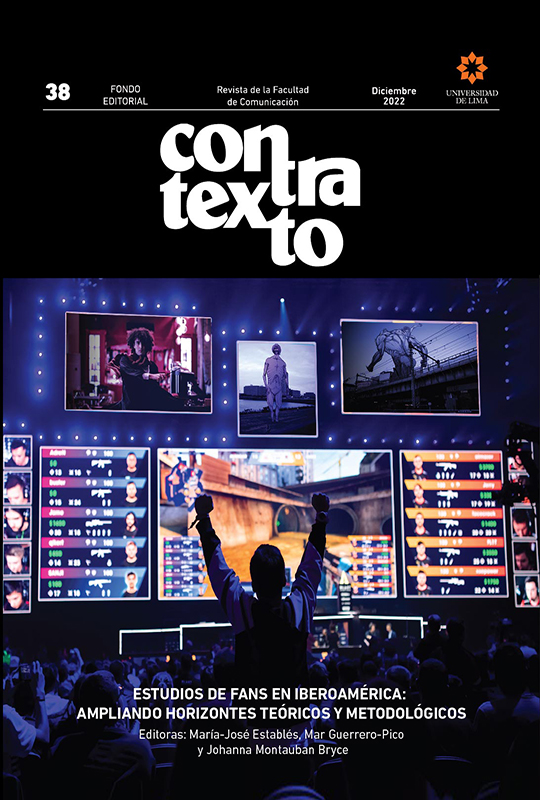Transmedia debates and nationalist identities through video games: theory and practice
DOI:
https://doi.org/10.26439/contratexto2022.n038.5873Keywords:
fan studies, technonationalism, emotions, aesthetic turnAbstract
Video games should be considered a form of propaganda. In this research, we use participant observation and interpretive analysis to study the role of video game fandom in the construction of nationalist cultures. The results show the audience's active role in the construction of nationalist identities and demonstrate how authoritarian regimes promote them.
Downloads
References
Bekkers, V., & Moody, R. (2015). Visual culture and public policy. Routledge.
Bjola, C. (2019). Propaganda as reflexive control: The digital dimension. En C. Bjola & J. Pamment (Eds.), Countering online propaganda and extremism (pp. 13-27). Routledge.
Booth, P. (2013). Augmenting fan/academic dialogue: New directions in fan research. Journal of Fandom Studies, 1(2), 119-137. https://doi.org/10.1386/jfs.1.2.1191
Bos, D. (2021). Playful encounters: Games for geopolitical change. Geopolitics, 1-25. https://doi.org/10.1080/14650045.2021.2002846
Callahan, W. (2020). Sensible politics. Visualizing international relations. Oxford University Press.
Castells, M. (2009). Communication Power. Oxford University Press.
Ceppi, N. (2014). La política exterior de Bolivia en tiempos de Evo Morales Ayma. Si Somos Americanos. Revista de Estudios Transfronterizos, 14(1), 125-151.
Crawford, N. (2000). The passion of world politics: Propositions on emotion and emotional relationships. International Security, 24(4), 116-156.
Duncombe, C., & Bleiker, R. (2015). Popular culture and political identity. En F. Caso & C. Hamilton (Coords.), Popular culture and world politics (pp. 35-44). E-International Relations Publishing.
Establés, M. J. (2016). Entre fans anda el juego: audiencias creativas, series de televisión y narrativas transmedia. Opción: Revista de Ciencias Humanas y Sociales, 32(11), 476-497. https://produccioncientificaluz.org/index.php/opcion/article/view/21962
Evans, A., & Stasi, M. (2014). Desperately seeking methodology: New directions in fan studies research. Participations. Journal of Audience & Reception Studies, 11(2), 4-23. https://curve.coventry.ac.uk/open/file/4aa65a26-18a2-4ab5-af83-67de9c89d838/1/Fan%20studies.pdf
Fang, K., & Repnikova, M. (2018). Demystifying “Little Pink”: The creation and evaluation of a gendered label for nationalistic activists in China. New Media & Society, 20(6), 2162-2185. https://journals.sagepub.com/doi/abs/10.1177/1461444817731923
Fathallah, M. (2017). Fanfiction and the author. Amsterdam University Press.
Fedorova, K. (2015, 10-14 de agosto). Augmented reality art and proprioception: Towards a theoretical framework [Comunicación en congreso]. ISEA 2015.
Fernández, M., & García-Reyes, D. (2021). Blacksad: Under the Skin. Transmedia and ludification as cultural experience. Revista de Comunicación, 20(2), 131-147.
Flanagan, M., & Nissenbaum, H. (2014). Values at play in digital games. MIT Press.
Fursan al-Aqsa: The Knights of the Al-Aqsa Mosque. (2021, 21 de octubre). Fursan al-Aqsa - The History of Palestine - English Trailer [Video]. YouTube. https://www.youtube.com/watch?v=L3S_2TjitLg
Gabriel, S. (2021). Hate speech in digital games. Are online games a place of discrimination and exclusion? En N. Denk, A. Serada, A. Pfeiffer & T. Wernbacher (Eds.), A ludic society (pp. 297-313). Donau-Universität Krems.
Goffman, E. (1990). The presentation of self in everyday life. Doubleday.
Gómez-García, S., Chicharro-Merayo, M., Vicent-Ibáñez, M., & Durántez-Stolle, P. (2022). La política a la que jugamos. Cultura, videojuegos y ludoficción política en la plataforma Steam. index.comunicación, 12(2), 277-303. https://doi.org/10.33732/ixc/12/02Lapoli
Guerrero-Pico, M. (2014). Producción y lectura de fan fiction en la comunidad online de la serie Fringe: transmedialidad, competencia y alfabetización mediática. Palabra Clave, 18(3), 722-745. https://doi.org/10.5294/pacla.2015.18.3.5
Hutchison, E., & Bleiker, R. (2014). Theorizing emotions in world politics. International Theory, 6(3), 491-514.
Jiang, Y. (2012). Cyber-nationalism in China. Challenging Western media portrayals of internet censorship in China. University of Adelaide Press.
Kaempf, S. (2018). Digital Media. En R. Bleiker (Ed.), Visual global politics (pp. 99-103). Routledge.
King, G., Pan, J., & Roberts, M. (2017). How the Chinese Government fabricates social media posts for strategic distraction, not engaged argument. American Political Science Review, 111(3), 484-501. https://doi.org/10.1017/S0003055417000144
Koschut, S. (2022). Emotions and international relations. International Studies. https://doi.org/10.1093/acrefore/9780190846626.013.693
Kreps, S. (2020). Social media and international relations. Cambridge University Press.
Lakoff, G. (2017). No pienses en un elefante. Península. Lammes, S. (2008). Spatial regimes of the digital playground: Cultural functions of spatial practices in computer games. Space and Culture, 11(3), 260-272. https://doi.org/10.1177/1206331208319150
MacDonald, F., Hughes, R., & Dodds, K. (Eds.). (2010). Observant States. Geopolitics and visual culture. I. B. Tauris.
Ming-Tak, M., & Wang, Y. (2021). How propagames work as a part of digital authoritarism: An analysis of a popular Chinese propagame. Media, Culture & Society, 43(8), 1431-1448. https://doi.org/10.1177/01634437211029846
Moreno, A. C. (2021). Tecnonacionalismo, guerra digital y videojuegos en China. Ediciones de la Universidad Complutense de Madrid.
Moreno, A. C. (2022). Tecnonacionalismo. El videojuego como objeto de estudio en las Ciencias Sociales. Tiempo Devorado. Revista de Historia Actual, 1, 33-58. https://revistes.uab.cat/tdevorado/article/view/v7-n1-moreno/163-pdf-es
Moreno, J. A. (2020). Game rules vs. fandom. How Nintendo’s Animal Crossing fan-made content negotiates the videogame meanings. Ámbitos. Revista Internacional de Comunicación, 47, 212-237.
Muriel, D. (2018). Nuevas formas (no intencionadas) de participación social y activismo político a través del ocio digital de Pokémon, tuits y gamificaciones. En A. Madariaga & A. Ponce de León (Eds.), Ocio y participación social en entornos comunitarios (pp. 145-168). Universidad de Deusto.
Pires, F., Vilasís-Pamos, J., Álvarez-Cueva, P., & Anglada-Pujol, O. (2020). Las prácticas de copresencia durante la COVID-19: co-playing en plataformas online. Hipertext.net, 21, 57-66. https://doi.org/10.31009/hipertext.net.2020.i21.05
Puente, H., Sequeiros, C., & Fernández, M. (2021). Discursos sociales en Cyberpunk 2077: un estudio de caso de los debates sociopolíticos de la comunidad de videojugadores en YouTube desde las Humanidades Digitales. Revista de Humanidades Digitales,6, 167-188. http://revistas.uned.es/index.php/RHD/article/view/30848/24320
Reuters. (2017, 2 de marzo). Bolivia reclama a Francia por un videojuego que muestra al país como un narcoestado. https://www.reuters.com/article/bolivia-videojuego-francia-idESKBN1692MC
Romero Bonifaz, C. (2022, 13 de febrero). En línea país [Video]. Facebook Watch. https://www.facebook.com/watch/?v=487851309394254
Rythoven, E. (2021). Walter Lippmann, emotion, and the history of international theory. International Theory, 1-25. doi: 10.1017/S1752971921000178
Schneider, F. (2018). China’s digital nationalism. Oxford University Press.
Shaw, I. G. R., & Warf, B. (2009). Worlds of affect: virtual geographies of videogames. Environment and Planning, 41, 1332-1343.
Skrebels, J. (2022, 25 de febrero). Guerra en Ucrania: presentan imágenes de videojuegos como videos falsos de este conflicto armado. IGN. https://www.ign.com/articles/ukraine-war-video-game-footage-arma-3-dcs-world
Sledziewski, H. (2022, 25 de febrero). This War of Mine review bombed by Chinese and Russians. Game Pressure. https://www.gamepressure.com/newsroom/this-war-of-mine-review-bombed-by-chinese-and-russians/za40cc
Snodgrass, J. (2016). Online virtual worlds as anthropological field sites: Ethnographic methods training via collaborative research of internet gaming cultures. Annals of Anthropological Practice, 40(2), 134-147.
Soporte de Steam. (s. f.). Normas y directrices de Steam: discusiones, reseñas y contenido generado por los usuarios. Steam. https://help.steampowered.com/es/faqs/view/6862-8119-C23E-EA7B
Taylor, I. (2018, 17 de octubre). Ubisoft Massive COO: “We don’t want to take a stance in current politics”. Gamesindustry.biz. https://www.gamesindustry.biz/articles/2018-10-17-ubisoft-massive-coo-we-dont-want-to-take-a-stance-in-current-politics
Trice, M., Potts, L., & Small, R. (2020). Values versus rules in social media communities: How platforms generate amorality on Reddit and Facebook. En J. Reyman & E. Sparby (Eds.), Digital ethics. Rhetoric and responsibility in online aggression (pp. 33-50). Routledge.
Tse, E. (2015). China’s disruptors. How Alibaba, Xiaomi, Tencent and other companies are changing the rules of business. Portfolio; Penguin Publishing Group. Ubisoft Latinoamérica. (2017, 23 de marzo). Ghost Recon Wildlands - ¿Cómo se escribió la historia del juego? [Video]. YouTube. https://www.youtube.com/watch?app=desktop&v=r4Cf73Q3gBw
Ubisoft Spain. (2016, 13 de junio). Tom Clancy’s Ghost Recon Wildlands - Tráiler E3 2016: Conoce al Cártel [Video]. YouTube. https://www.youtube.com/watch?v=ZTkCMOcFE4w
Vaux, P., Gallagher, A., & Davey, J. (2021). The extreme right on Steam. Institute for Strategic Dialogue. https://www.isdglobal.org/wp-content/uploads/2021/08/02-revised gaming-report-steam.pdf
Wen, T. (2022, 14 de abril). Generation Snitch. How censorship, nationalism, and wealth have shaped young Chinese. Foreign Policy. https://foreignpolicy.com/2022/04/14/china-youth-generation-snitch/
Ying, J. (2012). Cyber-Nationalism in China: Challenging Western media portrayals of internet censorship in China. University of Adeleide Press.
Zhang, X. (2008). Harmonious games localization for China. Multilingual Computing, 47-50. https://www.researchgate.net/publication/279931627_’Harmonious’_games_localization_for_China/link/559e9a9808aeab53f8fd5b76/download
Downloads
Published
Issue
Section
License
All of the works published are licensed under a CC BY 4.0 Creative Commons Attribution license. (updated on March 1st 2021)
The content of the journal may be shared in any material or format. The content may be adapted, contributed upon and transformed. Both possibilities are only permitted in so far as they complete the following conditions:
- Attribution: Credit must be given where it is due, a link to the license must be provided and changes, if made, must be indicated. This should be done in the manner deemed appropriate, without suggesting that the licensor promotes you or your use of the material.
Ownership rights
The patrimonial rights for Contratexto are published under a Creative Commons BY 4.0 license, allowing authors to keep the patrimonial rights to their work without restrictions.
If a work published in Contratexto were to be copied, distributed, spread, or any other activities contemplated in the aforementioned license, the author(s) and the journal must be mentioned visibly and expressly.
Self-archive
This journal allows and encourages authors to post items submitted to the journal on personal websites or institutional repositories both prior to and after publication, while providing bibliographic details that credit, if applicable, its publication in this journal.





















